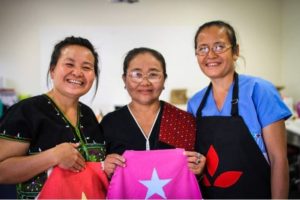Sewing enterprise knitting a community together
A group of Karen Burmese refugee women at Nhill in western Victoria have opened a social enterprise business in the town’s main street selling homewares and fabric products.
The women, who number around 25, have been gathering at the Nhill Learning Centre to sew the products which feature traditional Karen designs and which are on display in a previously vacant shop front.
The gatherings have been going on for a year and started as English and lifestyle classes at the centre.
 Now they have led to the creation of the business called Paw Po, which means ‘little flower’ in Karen, and opened this week after receiving a federal government grant to buy equipment.
Now they have led to the creation of the business called Paw Po, which means ‘little flower’ in Karen, and opened this week after receiving a federal government grant to buy equipment.
Volunteer sewing tutor Joy Deckert says when they began, many of the women had little English and some had never seen a sewing machine.
“It’s really exciting to see where this has gone,” Joy said.
Nhill Learning Centre Executive Officer Annette Creek has been one of the driving forces behind the project.
“We really just followed the ladies’ lead as they wanted to do something with their own fabrics and we understood their desire to work with their fabrics,” Ms Creek said.
Many of the women had never sewn before but now they have gained competency and confidence, she said.
“It’s exciting to look back and see how things have developed,” Ms Creek said.
Each participant works with a volunteer on a one-to-one basis to develop the skills needed; this includes having to sit a skills test before being issued with a certificate for completion of basic machine skills.
The women are making a range of items including aprons, oven mitts, cushion covers, pouches and bags with fabric coming from the refugee camps on the Thai-Myanmar border.
The new shop will eventually include a weaving loom to incorporate traditional designs into the contemporary product line range.
“We were also very aware of commercial realities and that we might not be able to have a market for traditional products so we looked to try and come up with something that might incorporate two cultures meeting,” Ms Creek said.
She said the shopfront would help strengthen ties with the community.
“We are feeling positive about the shopfront, not only because we are going to sell things but because of the connection with the community it will bring and just the opportunity for these ladies to develop more of an identity here in Nhill and in the surrounding area,” Ms Creek said.
The resettlement of Karen refugees at Nhill began in 2010 when local poultry producer Luv-a-Duck was looking for more labour to expand its plant.
Refugee settlement agency AMES Australia was approached to see if refugees would be willing to take up job in the town.
Since then around 200 Karen have moved to Nhill – creating economic and social benefits for the Karen and the town itself.
The program to resettle refugees in the town has resulted in positive outcomes for the refugee families and added more almost 100 jobs and more than $40 million to the local economy, according to an economic impact study.
The sewing enterprise is emblematic of this two-way relationship, with the arrival of the Karen refugees signalling a bonus for the town.
Aged from 18 to 70 years old, the women in the group are currently not employed, with many of them partners of men who work at Luv-a-Duck manufacturing plant.
Ms Creek said each of them had a variety of skills and goals, including looking for work opportunities.
“For many of them, they have huge aspirations like you or I would, to be productive and to have a fulfilling career,” she said.
“Unfortunately, due to their lower levels of English, it’s very difficult for them but learning to sew gives them an opportunity to improve their skill set,” Ms Creek said.
The group now plans to develop an online sales facility and ultimately create a self-sustaining business.
Laurie Nowell
AMES Australia Senior Journalist












